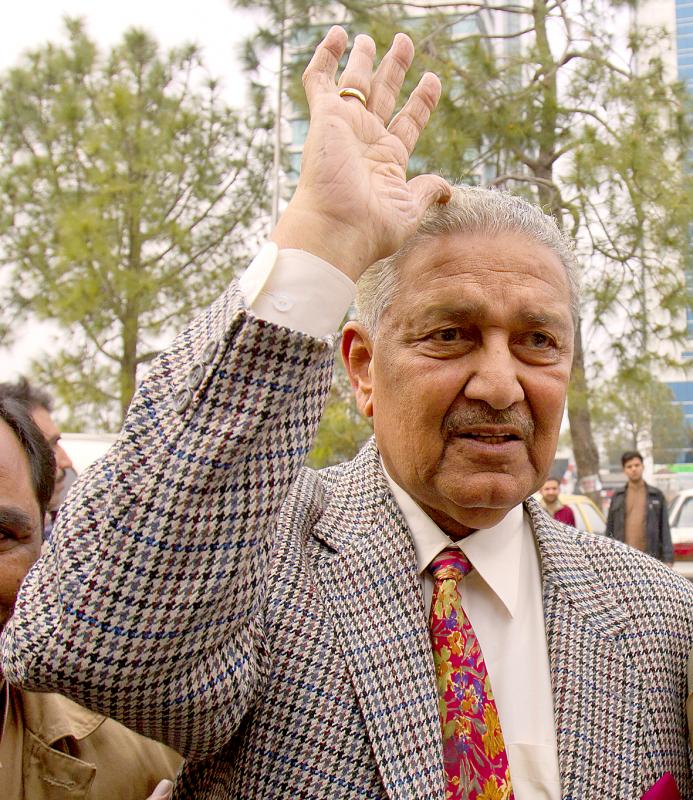Abdul Qadeer Khan, who died yesterday, was lauded in Pakistan for transforming it into the world’s first Islamic nuclear weapons power.
However, he was seen by the West as a dangerous renegade responsible for smuggling technology to rogue states.
The nuclear scientist, who died at 85 in Islamabad after being hospitalized with COVID-19, was revered as the “father of Pakistan’s nuclear bomb.”

Photo: EPA-EFE
He was seen as a national hero for bringing the country up to par with archrival India in the atomic field and making its defenses “impregnable.”
However, he found himself in the crosshairs of controversy when he was accused of illegally proliferating nuclear technology to Iran, Libya and North Korea.
Khan was placed under effective house arrest in the capital Islamabad in 2004, after he admitted to running a proliferation network to the three countries.
A court ended his house arrest in February 2009, but his movements were strictly guarded, and he was accompanied by authorities every time he left his home in an upscale sector of Islamabad.
Born in Bhopal, India, on April 1, 1936, Khan was just a young boy when his family migrated to Pakistan during the bloody 1947 partition of the subcontinent at the end of British colonial rule.
He did a science degree at Karachi University in 1960, then went on to study metallurgical engineering in Berlin before completing advanced studies in the Netherlands and Belgium.
The crucial contribution to Pakistan’s nuclear program was the procurement of a blueprint for uranium centrifuges, which transform uranium into weapons-grade fuel for nuclear fissile material.
He was charged with stealing it from the Netherlands while working for Anglo-Dutch-German nuclear engineering group Urenco, and taking it to Pakistan in 1976.
On his return to Pakistan, then-Pakistani prime minister Zulfikar Ali Bhutto put Khan in charge of the government’s nascent uranium enrichment project.
By 1978, his team had enriched uranium and by 1984, they were ready to detonate a nuclear device, Khan later said in a newspaper interview.
The 1998 nuclear test saw Pakistan slapped with international sanctions and sent its economy into freefall.
Khan’s aura began to dim in March 2001 when then-Pakistani president Pervez Musharraf, reportedly under US pressure, removed him from the chairmanship of Kahuta Research Laboratories and made him a special adviser.
After Islamabad received a letter from the International Atomic Energy Agency containing allegations that Pakistani scientists were the source of sold-off nuclear knowledge, Khan was questioned.
In a speech, he told the Pakistan Institute of National Affairs in 1990 that he had dealings on world markets while developing Pakistan’s nuclear program.
It was taken as a confession, but Khan was pardoned by Musharraf. Later, he retracted his remarks.
“I saved the country for the first time when I made Pakistan a nuclear nation, and saved it again when I confessed and took the whole blame on myself,” Khan said in an interview in 2008.
After Islamabad carried out atomic tests in 1998 in response to tests by India, Khan said Pakistan “never wanted to make nuclear weapons. It was forced to do so.”

IDENTITY: A sex extortion scandal involving Thai monks has deeply shaken public trust in the clergy, with 11 monks implicated in financial misconduct Reverence for the saffron-robed Buddhist monkhood is deeply woven into Thai society, but a sex extortion scandal has besmirched the clergy and left the devout questioning their faith. Thai police this week arrested a woman accused of bedding at least 11 monks in breach of their vows of celibacy, before blackmailing them with thousands of secretly taken photos of their trysts. The monks are said to have paid nearly US$12 million, funneled out of their monasteries, funded by donations from laypeople hoping to increase their merit and prospects for reincarnation. The scandal provoked outrage over hypocrisy in the monkhood, concern that their status

Trinidad and Tobago declared a new state of emergency on Friday after authorities accused a criminal network operating in prisons across the country of plotting to kill key government officials and attack public institutions. It is the second state of emergency to be declared in the twin-island republic in a matter of months. In December last year, authorities took similar action, citing concerns about gang violence. That state of emergency lasted until mid-April. Police said that smuggled cellphones enabled those involved in the plot to exchange encrypted messages. Months of intelligence gathering led investigators to believe the targets included senior police officers,

A disillusioned Japanese electorate feeling the economic pinch goes to the polls today, as a right-wing party promoting a “Japanese first” agenda gains popularity, with fears over foreigners becoming a major election issue. Birthed on YouTube during the COVID-19 pandemic, spreading conspiracy theories about vaccinations and a cabal of global elites, the Sanseito Party has widened its appeal ahead of today’s upper house vote — railing against immigration and dragging rhetoric that was once confined to Japan’s political fringes into the mainstream. Polls show the party might only secure 10 to 15 of the 125 seats up for grabs, but it is

Philippine President Ferdinand Marcos Jr is to meet US President Donald Trump this week, hoping Manila’s status as a key Asian ally would secure a more favorable trade deal before the deadline on Friday next week. Marcos would be the first Southeast Asian leader to meet Trump in his second term. Trump has already struck trade deals with two of Manila’s regional partners, Vietnam and Indonesia, driving tough bargains in trade talks even with close allies that Washington needs to keep onside in its strategic rivalry with China. “I expect our discussions to focus on security and defense, of course, but also